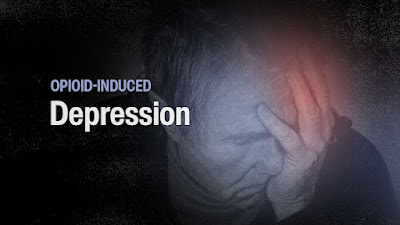Opioids are a class of drugs commonly used to treat pain.
They work by binding to specific receptors in the brain, spinal cord, and
gastrointestinal tract, which help to block pain signals and produce a sense of
well-being. However, prolonged use of opioids can lead to a number of negative
side effects, including an increased risk of clinical depression.
Causes
There are several reasons why opioids may cause clinical
depression:
- Disruption
of the brain's reward system: Opioids can cause a surge of dopamine, a
neurotransmitter associated with pleasure and reward, leading to a
"high" or feeling of euphoria. However, this can also disrupt
the brain's normal reward system, leading to changes in mood and an
increased risk of depression.
- Changes
in brain chemistry: Opioids can also cause changes in the levels of other
neurotransmitters, such as serotonin and norepinephrine, which are
important in regulating mood. An imbalance in these neurotransmitters can
contribute to the development of depression.
- Chronic
Pain Management: Many individuals use opioids to manage chronic pain.
While opioids may alleviate pain initially, long-term use can lead to
increased sensitivity to pain (hyperalgesia), which can negatively impact
mental health.
- Physical
dependence and withdrawal: Prolonged use of opioids can lead to physical
dependence, meaning that a person experiences withdrawal symptoms when
they stop taking the drug. These withdrawal symptoms can include anxiety,
agitation, and depression.
- Underlying
mental health conditions: People who have a history of mental health
conditions, such as depression or anxiety, may be at increased risk of
developing clinical depression while taking opioids.
- Cognitive Impairment: Opioid use can impair cognitive function, leading to difficulties in problem-solving and decision-making, which can increase feelings of frustration and sadness.
- Social and Psychological Factors: Chronic opioid use can lead to social isolation, relationship issues, and financial problems, all of which can contribute to feelings of hopelessness and depression.
Risk Factors
Not everyone who takes opioids will experience depression, but certain factors can increase the risk. These may include:
- Genetic Predisposition: Some individuals may be more susceptible to the mood-altering effects of opioids due to genetic variations that influence how their brain responds to the drugs.
- Underlying Mental Health Conditions: People with a history of depression or anxiety disorders may be more likely to develop depressive symptoms while taking opioids.
- Extended Use: Long-term use of opioids can increase the likelihood of developing depression as the brain adapts to the presence of the drugs.
Minimizing the Risks
Minimizing the risk of clinical depression associated
with opioid use involves several strategies:
1. Use
Alternatives for Pain Management whenever possible: Explore non-opioid
medications (e.g., NSAIDs, acetaminophen). Consider physical therapy,
acupuncture, or other complementary therapies.
2. Follow
Prescribing Guidelines: Use opioids only as prescribed by a healthcare
professional. Regularly review the need for continued opioid use with your
doctor.
3. Monitor
Mental Health: Be aware of mood changes and seek help if symptoms of depression
arise. Consider regular screenings for depression, especially during long-term
opioid therapy.
4. Implement
a Support System: Engage family and friends for emotional support. Consider
joining support groups for individuals dealing with chronic pain or substance
use.
5. Practice
Stress Management Techniques: Incorporate mindfulness, meditation, or yoga to
reduce stress and improve mood. Maintain a routine that includes physical
activity, which can enhance mental well-being.
6. Limit
Duration of Use: Aim to use opioids for the shortest duration necessary. Gradually
taper off under medical supervision if long-term use is required.
7. Educate
Yourself and Others: Understand the risks associated with opioid use and
educate those around you. Discuss concerns with healthcare providers openly.
8. Seek
Professional Help: If feelings of depression arise, consider therapy or
counseling. A mental health professional can provide strategies tailored to
your situation.
Interactions between opioids and antidepressants
If you already suffer from clinical depression, adding
opioids to your medication plan may get the matter worse. Pharmacodynamic
interactions occur when one drug alters the effect of another drug on the body.
In the case of opioids and antidepressants, there are several possible
pharmacodynamic interactions:
·
Respiratory depression: Opioids can cause respiratory
depression, a condition characterized by slow, shallow breathing.
Antidepressants, particularly tricyclic antidepressants (TCAs), can exacerbate
this effect, leading to a higher risk of respiratory distress and even
respiratory failure.
·
Sedation: Both opioids and antidepressants can
cause sedation, and when used concurrently, the risk of excessive sedation and
impaired cognitive function increases.
·
Serotonin syndrome: Opioids, such as tramadol,
have weak serotonergic activity, which, when combined with serotonergic
antidepressants (e.g., selective serotonin reuptake inhibitors,
serotonin-norepinephrine reuptake inhibitors), increases the risk of serotonin
syndrome, a potentially life-threatening condition resulting from excessive
serotonin levels in the body.
